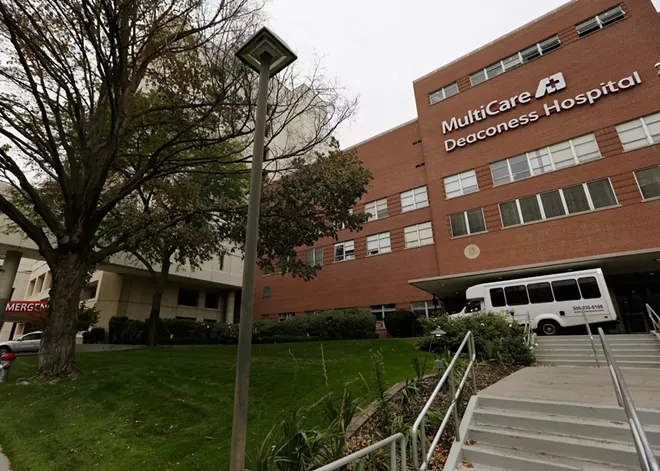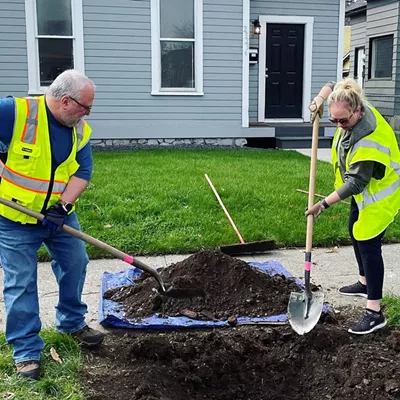
Last week, the state Department of Commerce announced it would be disbursing nearly $13 million in behavioral health grants to the Inland Northwest. This funding, which comes from the state's capital budget, will allow health providers to build or renovate behavioral health facilities to increase capacity in the region.
This year, grants were distributed to projects that would fulfill regional needs, increase access to those under age 18, or build intensive treatment facilities that could support individuals needing long-term placements.
"These projects are all over the board," says Leslie Wolff, community programs manager for the Department of Commerce. "We were lucky in getting a lot of projects funded for inpatient programs, and it was really lovely to put money into children and minor behavioral health facilities, too."
Among the funding in Eastern Washington is a $2 million grant for Stevens County's Northeast Washington Alliance Counseling Services (NEWACS) to build a 14-bed crisis stabilization facility in Colville.
"Currently, there is no licensed residential treatment facility in any rural county within the Spokane Regional Service Area," NEWACS Executive Director David Nielsen said in an Aug. 5 news release. (The organization did not return calls or emails seeking comment for this story last week.) "The new facility will benefit the rural counties in northeast Washington by bringing stabilization services into a fully licensed residential treatment facility in the heart of the Colville community."
Four grants in this round of funding were sent to organizations in Spokane County. This includes: $6 million for MultiCare Foundations to build an inpatient behavioral health unit; $1.75 million for HIP of Spokane County (otherwise known as Community-Minded Enterprises) to introduce an integrated behavioral health substance use disorder project; $445,850 for Liberty Lake Couple and Family Therapy, LLC to build a family therapy clinic; and $2.5 million for Regal Care Residential to construct a new intensive behavioral health treatment facility.
MultiCare will be building a new inpatient unit in Deaconess Hospital, which is expected to house at least 20 new behavioral health beds, says Samantha Clark, assistant vice president of strategy and business development for the MultiCare Behavioral Health Network.
"Deaconess Hospital has one of the highest volumes of behavioral health services, but what we need more of is the combination of health and mental health services," Clark says. "This grant is really a reflection of what's needed in our community."
Many mental health offices don't have medical doctors available for patients, so many medical needs may fall through the cracks. Clark believes that offering behavioral health care in the same place where folks can get medical care will solve that issue and create a more holistic system.
"When we silo treatment into one or the other (medical care or mental health care), we're always going to miss something," Clark says. "I think health care is making great strides towards whole-person care, but we still have a really long way to go."
The Department of Commerce has been funding these grants since 2013 as a part of the agency's Behavioral Health Facilities program. Since the start of the program, Wolff says that $65 million allocated in the Spokane area has funded nine outpatient facilities and created 444 new treatment beds.
These funds have been impactful, but Spokane County Community Services Department Director Justin Johnson says Commerce's numbers don't take into account how many beds were lost during the same time period, nor do they account for beds that are unavailable to some in the community.
"They may have increased bed capacity, but there may have been closed beds," Johnson explains. "A bed is not actually a bed. Each facility that opens has a level of care, so a stabilization bed is only available for those specific services. Also, if a facility is not contracted with a specific insurance company it can't be used by patients who have that insurance."
However, Johnson is clear that these behavioral health facilities grants, especially the one funding a crisis stabilization facility in Colville, are going to be integral to the region. Stabilization is an important process that allows patients to get a full range of medical, mental health and substance use treatment, so they can get their lives back on track.
"We've been working with the Northeast Washington Alliance of Counseling Services, and this is the level of care that they're looking for," Johnson says. "It's desperately needed in the county since we lost the stabilization unit that was through Frontier Behavioral Health."
The Frontier stabilization unit that Johnson is referencing was closed in June 2022 due in part to staffing shortages and reduced funding due to a drop in usage by patients. Because of that closure, the Spokane Regional Stabilization Center is currently the only one throughout Spokane, Stevens, Ferry, Lincoln, Adams and Pend Oreille counties.
"One facility serving over 600,000 people seems low to me," Johnson says.
The closest other options are in Wenatchee and the Tri-Cities, but those are overwhelmed right now, Johnson says.
While these grants are important for the Inland Northwest and Spokane County, they're just the beginning of a long road ahead for these organizations.
"Any of these capital investments are going to take years to implement," he says. "All people see is [the Department of Commerce] awarded a grant, but they did not grant any long-term contracts or arrange for each insurance company to pay for people to use [these facilities]. There's still a lot of work to be done." ♦
























